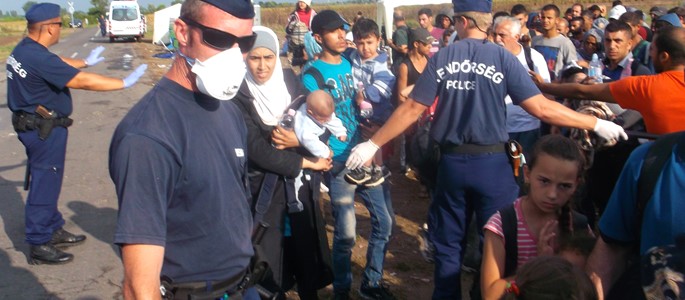431 asylum seekers in risk of being returned from Denmark to Hungary
For more than one year, Dublin returns to Hungary have been on hold – decisions must be made before December
Photo: Hungarian police detains refugees, October 2015 (Brian Esbensen)
According to the Dublin agreement, an asylum application should be considered in the first country that registered the person, usually in the form of fingerprints. That is, unless that first country does not live up to the basic standards – which has led to returns from Denmark being blocked or put on hold for shorter or longer periods of time when it concerned Bulgaria, Italy, Greece, and for one year now, Hungary.
Danish newspaper Politiken writes on November 6th about the prolonged Danish case handling, which is criticised from several sides (unfortunately the articles are not online).
During summer and autumn 2015, thousands of migrants were streaming through Hungary before the fences were put up, and many had their fingerprints taken by force and violence. 174,000 applications were registered, but only 545 ended up getting asylum in Hungary. This is due partly to the fact that most of them had their cases opened in other countries, and partly because only 15% of the cases that Hungary actually handled were granted asylum – in sharp contrast to EUs average of 52% and Denmark's of 81%.
Nobody wants to stay in Hungary, where the government is campaigning against muslim refugees and were most people passing through have been exposed to verbal and physical assaults. Hungary generally treats asylum seekers as criminals. For these reasons, everyone has continued to other countries, where most of them have their case opened in spite of the fingerprints. A number of reports document that Hungary does not have an efficient asylum procedure, systematically detains people under inhumane conditions and return asylum seekers to Serbia, which in its turn returns them to their home country. The latter is called refoulement, and it is a violation of human rights.
The Danish Immigration Service is, however, not convinced by the reports and the warnings from among others the UN Refugee High Commissioner, the Hungarian Helsinki Committee, the American Foreign Office and the European Council on Refugees (ECRE). But the Refugees Appeals Board, which also handles appeals in Dublin decisions , put a stop to returns to Hungary in October last year. Since then, Immigration Service and the Danish Ministry of Foreign Affairs have spent one year partly awaiting the result of the two pending cases at the European Court of Human Rights and partly 'investigating the case carefully.'
Politiken mentions three national court decisions from France, Sweden and Finland, all stating that a return to Hungary would be illegal, meaning that all cases must be handled in the three countries mentioned.
According to head of the asylum department in Danish Refugee Council, Eva Singer, the government is prolonging the cases unnecessarily, and she adds that "there is clearly no doubt that it will be a violation of human rights to send them back to Hungary." And following an EU directive on return, which Denmark has signed, a decision must be made before December.
Many of the 431 persons have been waiting in Denmark for around one year, and as long as the cases are on hold, they are still in Phase 1. That means they will only receive the basic allowance of 805 DKR every fortnight and have no access to job, internships or school.


